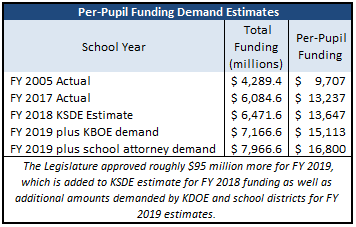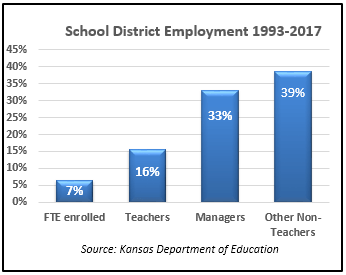“How much” may be the number one question bandied about as the 2018 legislative session gets underway – as in, how much money will it take to satisfy the Supreme Court on school funding – but that’s not the most important question. Regardless of whether legislators choose to add a single dollar to the record amount already provided, the most important question is whether legislators will add real accountability measures to the school funding formula to ensure students are getting the education they deserve. Otherwise, students won’t see much (if any) benefit regardless of funding levels.
The education lobby’s underlying premise is that simply spending more money magically causes outcomes to improve. There are some researchers who believe there’s a correlation (not causation, mind you; just correlation) between spending and achievement, but even they acknowledge that it’s how money is spent that can make a difference rather than simply spending more money.
 Taxpayers already provide record-setting funding. The Department of Education says last year’s record was $13,237 per-pupil and they say it will jump to $13,647 this year with the first of a two-year phase-in of $293 million more in state aid. The State Board of Education wants another $600 million but the schools’ lawyers want at least $1.4 billion more; on top of additional funding already pledged for FY 2019, their demands would take funding to $15,113 and $16,800 respectively. The final numbers would likely be even higher, as more money spent on personnel would increase KPERS pension funding.
Taxpayers already provide record-setting funding. The Department of Education says last year’s record was $13,237 per-pupil and they say it will jump to $13,647 this year with the first of a two-year phase-in of $293 million more in state aid. The State Board of Education wants another $600 million but the schools’ lawyers want at least $1.4 billion more; on top of additional funding already pledged for FY 2019, their demands would take funding to $15,113 and $16,800 respectively. The final numbers would likely be even higher, as more money spent on personnel would increase KPERS pension funding.
School funding formulas have never required districts to spend money efficiently and there are no limits on accumulation of excess cash reserves (now at a record $928 million). Money specifically provided to improve achievement for low income students doesn’t have to be spent for that exclusive purpose, and research shows that much of it is spent for other purposes. And most important, schools have never been held accountable for improving outcomes – as in, there is a student-focused consequence if achievement doesn’t improve.
Most researchers agree that having effective teachers benefits students more than anything else. Yet absent real accountability measures, school boards routinely divert money that could be used to attract and reward effective teachers.
Voters overwhelmingly support having 
non-instructional functions provided regionally at lower cost and putting the savings into instruction. The education lobby is defiantly opposed. With a 7 percent enrollment increase since 1993, school boards hired 16 percent more teachers but 33 percent more managers and 39 percent more other non-teachers.
And amazingly, school boards on average allocate just 53 percent of total spending to instruction (not counting capital spending allocated to instruction); that allocation has actually declined since 2005.
Regardless of the rationale for choices like these, they represent conscious decisions to divert money from instruction and teacher pay.
Taxpayers spent $111 billion on public education over the last 25 years in Kansas, and here’s what that has produced:
– Only 29 percent of those taking the ACT are considered college-ready in English, Reading, Math and Science.
– Less than 30 percent of 10th graders on track for college and career according to the state assessment.
– Only about a quarter of low income students are proficient in Reading and Math on the National Assessment of Educational Progress, and just about half of their more affluent peers are proficient.
These results are completely unacceptable, and doing the same thing over and over again – spending more money without real accountability – will continue to deprive generations of kids of the education they deserve.
Aside from the education lobby, there’s not much disagreement on this when the facts are known. But saying so publicly invites nasty accusations of hating teachers, kids and public education, and it’s hard to get re-elected in the face of such allegations. So if you want to help students get the education they deserve, tell your elected officials you’ll have their backs if they support students over lawyers with real accountability measures.




